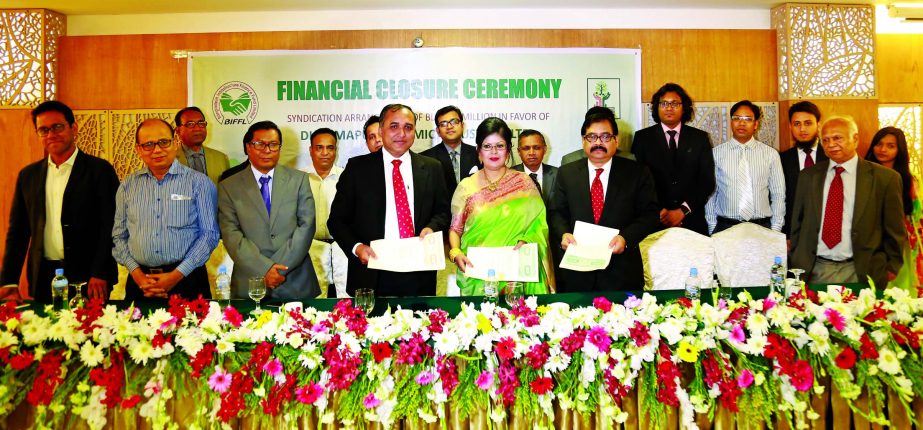
Business Desk :
Bangladesh Infrastructure Finance Fund Limited (BIFFL) organized “Financial Closure Ceremony of Dharmapur Ceramic Industries Limited (DCIL)” in the capital recently.
DCIL is an energy efficient and eco-friendly Green Brick manufacturing project.
BIFFL worked as the lead arranger of the syndication facility for this project. The facility of BDT400.00 million was shared equally by BIFFL and Bangladesh Commerce Bank Limited (BCBL).
S. M. Formanul Islam, Executive Director & CEO, BIFFL; R Q M Forkan, Managing Director, Bangladesh Commerce Bank Limited and representatives from Bangladesh Bank, Asian Development Bank (ADB) and Department of Environment (DoE) were present in the event.
BIFFL’s management said, there is no denying of the urgency of reducing environmental pollution and social hazards created by the traditional brick kilns in Bangladesh.
According to DoE’s estimate, there exist about 7,000-8,000 traditional brick kilns in the country which causes about 37% of pollution in the environment. In line with the Government’s vision for sustainable development and commitment of building a greener Bangladesh, it is highly required to promote the Green Brick Industries as an alternative solution to replace the outdated technologies.
Bangladesh Infrastructure Finance Fund Limited (BIFFL) organized “Financial Closure Ceremony of Dharmapur Ceramic Industries Limited (DCIL)” in the capital recently.
DCIL is an energy efficient and eco-friendly Green Brick manufacturing project.
BIFFL worked as the lead arranger of the syndication facility for this project. The facility of BDT400.00 million was shared equally by BIFFL and Bangladesh Commerce Bank Limited (BCBL).
S. M. Formanul Islam, Executive Director & CEO, BIFFL; R Q M Forkan, Managing Director, Bangladesh Commerce Bank Limited and representatives from Bangladesh Bank, Asian Development Bank (ADB) and Department of Environment (DoE) were present in the event.
BIFFL’s management said, there is no denying of the urgency of reducing environmental pollution and social hazards created by the traditional brick kilns in Bangladesh.
According to DoE’s estimate, there exist about 7,000-8,000 traditional brick kilns in the country which causes about 37% of pollution in the environment. In line with the Government’s vision for sustainable development and commitment of building a greener Bangladesh, it is highly required to promote the Green Brick Industries as an alternative solution to replace the outdated technologies.

